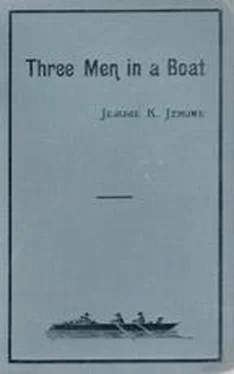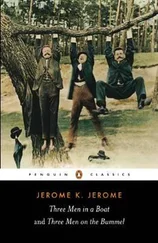«It's always in the same place my boy,» was the stolid reply: «just behind you.»
«I don't see it,» said George, turning round.
«Why, bless us, where's your eyes?» was the man's comment, as he twisted George round and pointed up and down the stream. «There's enough of it to see, ain't there?»
«Oh!» exclaimed George, grasping the idea; «but we can't drink the river, you know!»
«No; but you can drink SOME of it,» replied the old fellow. «It's what I've drunk for the last fifteen years.»
George told him that his appearance, after the course, did not seem a sufficiently good advertisement for the brand; and that he would prefer it out of a pump.
We got some from a cottage a little higher up. I daresay THAT was only river water, if we had known. But we did not know, so it was all right. What the eye does not see, the stomach does not get upset over.
We tried river water once, later on in the season, but it was not a success. We were coming down stream, and had pulled up to have tea in a backwater near Windsor. Our jar was empty, and it was a case of going without our tea or taking water from the river. Harris was for chancing it. He said it must be all right if we boiled the water. He said that the various germs of poison present in the water would be killed by the boiling. So we filled our kettle with Thames backwater, and boiled it; and very careful we were to see that it did boil.
We had made the tea, and were just settling down comfortably to drink it, when George, with his cup half–way to his lips, paused and exclaimed: «What's that?»
«What's what?» asked Harris and I.
«Why that!» said George, looking westward.
Harris and I followed his gaze, and saw, coming down towards us on the sluggish current, a dog. It was one of the quietest and peacefullest dogs I have ever seen. I never met a dog who seemed more contented — more easy in its mind. It was floating dreamily on its back, with its four legs stuck up straight into the air. It was what I should call a full–bodied dog, with a well–developed chest. On he came, serene, dignified, and calm, until he was abreast of our boat, and there, among the rushes, he eased up, and settled down cosily for the evening.
George said he didn't want any tea, and emptied his cup into the water. Harris did not feel thirsty, either, and followed suit. I had drunk half mine, but I wished I had not.
I asked George if he thought I was likely to have typhoid.
He said: «Oh, no;» he thought I had a very good chance indeed of escaping it. Anyhow, I should know in about a fortnight, whether I had or had not.
We went up the backwater to Wargrave. It is a short cut, leading out of the right–hand bank about half a mile above Marsh Lock, and is well worth taking, being a pretty, shady little piece of stream, besides saving nearly half a mile of distance.
Of course, its entrance is studded with posts and chains, and surrounded with notice boards, menacing all kinds of torture, imprisonment, and death to everyone who dares set scull upon its waters — I wonder some of these riparian boors don't claim the air of the river and threaten everyone with forty shillings fine who breathes it — but the posts and chains a little skill will easily avoid; and as for the boards, you might, if you have five minutes to spare, and there is nobody about, take one or two of them down and throw them into the river.
Half–way up the backwater, we got out and lunched; and it was during this lunch that George and I received rather a trying shock.
Harris received a shock, too; but I do not think Harris's shock could have been anything like so bad as the shock that George and I had over the business.
You see, it was in this way: we were sitting in a meadow, about ten yards from the water's edge, and we had just settled down comfortably to feed.
Harris had the beefsteak pie between his knees, and was carving it, and George and I were waiting with our plates ready.
«Have you got a spoon there?» says Harris; «I want a spoon to help the gravy with.»
The hamper was close behind us, and George and I both turned round to reach one out. We were not five seconds getting it. When we looked round again, Harris and the pie were gone!
It was a wide, open field. There was not a tree or a bit of hedge for hundreds of yards. He could not have tumbled into the river, because we were on the water side of him, and he would have had to climb over us to do it.
George and I gazed all about. Then we gazed at each other.
«Has he been snatched up to heaven?» I queried.
«They'd hardly have taken the pie too,» said George.
There seemed weight in this objection, and we discarded the heavenly theory.
«I suppose the truth of the matter is,» suggested George, descending to the commonplace and practicable, «that there has been an earthquake.»
And then he added, with a touch of sadness in his voice: «I wish he hadn't been carving that pie.»
With a sigh, we turned our eyes once more towards the spot where Harris and the pie had last been seen on earth; and there, as our blood froze in our veins and our hair stood up on end, we saw Harris's head — and nothing but his head — sticking bolt upright among the tall grass, the face very red, and bearing upon it an expression of great indignation!
George was the first to recover.
«Speak!» he cried, «and tell us whether you are alive or dead — and where is the rest of you?»
«Oh, don't be a stupid ass!» said Harris's head. «I believe you did it on purpose.»
«Did what?» exclaimed George and I.
» Why, put me to sit here — darn silly trick! Here, catch hold of the pie.»
And out of the middle of the earth, as it seemed to us, rose the pie — very much mixed up and damaged; and, after it, scrambled Harris — tumbled, grubby, and wet.
He had been sitting, without knowing it, on the very verge of a small gully, the long grass hiding it from view; and in leaning a little back he had shot over, pie and all.
He said he had never felt so surprised in all his life, as when he first felt himself going, without being able to conjecture in the slightest what had happened. He thought at first that the end of the world had come.
Harris believes to this day that George and I planned it all beforehand. Thus does unjust suspicion follow even the most blameless for, as the poet says, «Who shall escape calumny?»
Who, indeed!
WARGRAVE. — WAXWORKS. — SONNING. — OUR STEW. — MONTMORENCY IS SARCASTIC. — FIGHT BETWEEN MONTMORENCY AND THE TEA–KETTLE. — GEORGE'S BANJO STUDIES. — MEET WITH DISCOURAGEMENT. — DIFFICULTIES IN THE WAY OF THE MUSICAL AMATEUR. — LEARNING TO PLAY THE BAGPIPES. — HARRIS FEELS SAD AFTER SUPPER. — GEORGE AND I GO FOR A WALK. — RETURN HUNGRY AND WET. — THERE IS A STRANGENESS ABOUT HARRIS. — HARRIS AND THE SWANS, A REMARKABLE STORY. — HARRIS HAS A TROUBLED NIGHT.
WE caught a breeze, after lunch, which took us gently up past Wargrave and Shiplake. Mellowed in the drowsy sunlight of a summer's afternoon, Wargrave, nestling where the river bends, makes a sweet old picture as you pass it, and one that lingers long upon the retina of memory.
The «George and Dragon» at Wargrave boasts a sign, painted on the one side by Leslie, R.A., and on the other by Hodgson of that ilk. Leslie has depicted the fight; Hodgson has imagined the scene, «After the Fight» — George, the work done, enjoying his pint of beer.
Day, the author of SANDFORD AND MERTON, lived and — more credit to the place still — was killed at Wargrave. In the church is a memorial to Mrs. Sarah Hill, who bequeathed 1 pound annually, to be divided at Easter, between two boys and two girls who «have never been undutiful to their parents; who have never been known to swear or to tell untruths, to steal, or to break windows.» Fancy giving up all that for five shillings a year! It is not worth it.
Читать дальше












